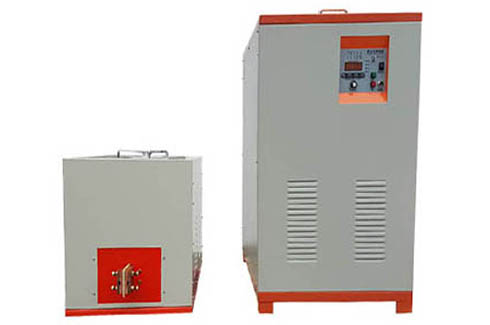In an induction heating system, most of the electrical energy is transferred to the cooling water in the form of heat. Although when the workpiece is heated by the high frequency induction heating machine, the heat generated by the workpiece is absorbed by the quenching liquid, and the quenching liquid is cooled by the heat exchanger, but the other half of the heat needs to be absorbed by cooling water. Therefore, when heating, the water quality of the cooling water occupies a very important position in the induction heating system. Poor water quality will affect the later maintenance problems. Then we need to understand the water quality of the cooling water from 6 aspects.
1. Suspended solids. If there are suspended solids in the cooling water, if we do not clean them up in time and let them accumulate, it will block the narrow water channels in the transformer and capacitor of the high-frequency induction heating machine. When the pump is shut down, suspended solids can settle in the lower parts of the cooling pipes, causing eventual clogging.
2. PH value, the cooling circuit is mainly composed of brass and pure copper pipe joints and pipes. When the PH value is between 6-8, the cooling effect of the workpiece is very good. However, if the pH value is lower than 6, the brass will corrode, and if it is higher than 8, it will be covered with dirt.
3. Microbial contamination. Although the system containing copper usually does not appear biological contamination, the cooling system may be infected by algae and microorganisms. This in turn may lead to equipment corrosion, clogging, and reduced heat transfer. Therefore, after the system has been used for a period of time, it is necessary to ask professionals to clean up the microorganisms that may be produced in the water.
4. The gas is dissolved. If the cooling water is stirred continuously after contacting the air, the carbon dioxide dissolved in the water will reduce the pH value of the water, thereby accelerating the corrosion of the cooling water. When the induction heating system uses cooling water that does not remove the dissolved gas in time, it will malfunction at any time.
5. Electric corrosion. When connecting the induction heating system, use electroplated joints, and do not let different metals touch each other, otherwise it will cause poor matching of the high-frequency induction heating machine and water pollution.
6. Solids are dissolved. Dissolved solids will directly affect the conductivity of cooling water. If the conductivity is too high, electrolysis will occur in the cooling channel with DC voltage potential, because the content of dissolved solids can be identified by the conductivity of the water. So the maximum recommended value of conductivity is constant.
In an induction heating system, different elements have different cooling requirements, so the cooling water required for power cooling, heating units, induction coils and electrical components in the quenching system have different flow requirements.




 en
en  cn
cn  jp
jp  ko
ko  de
de  es
es  it
it  ru
ru  pt
pt  vi
vi  th
th  pl
pl 







 GS-ZP-1200
GS-ZP-1200


